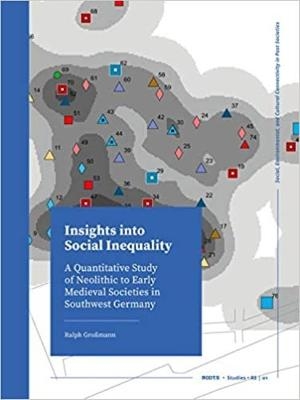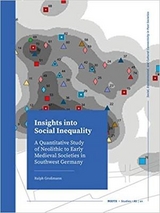Insights into Social Inequality
Sidestone Press (Verlag)
978-90-8890-977-1 (ISBN)
Social inequality is a subject of contemporary concerns. Life capabilities and the access to resources vary significantly in rich and poor countries, between elites and others. Furthermore, inequalities based on bio-anthropological and non-bio-anthropological causes are almost universal. Accordingly, inequality was also inherent in past societies and archaeologists have continually examined and interpreted social inequalities in sources such as burial grounds.
This book continues such analyses with a new multi-proxy approach. It reveals social inequalities in selected past burial grounds from Southwestern Germany. The burial grounds date to the Early Neolithic (Schwetzingen), the Late Neolithic (Lauda-Königshofen), the Early Bronze Age (Singen), the Early Iron Age (Magdalenenbergle), and the Early Medieval period (Horb-Altheim). The challenge was to identify hierarchical and heterarchical differences and inequalities within the burial grounds based on a multitude of different proxies. The examination encompasses variations in the distribution of grave goods, burial pit sizes, bio-anthropological and isotope data. Furthermore, spatial analyses of burial grounds and, in particular, on the distances between the graves play an essential role in this examination.
The results reveal social inequalities among and within genders and age cohorts that are differently pronounced in the respective cemeteries. Furthermore, the results of multi-proxy analyses lead to the interpretation that the sites differ concerning the respective degrees of inequality and power strategy modes. In detail, it can be observed that the Early Iron Age and the Early Bronze Age sites demonstrate a relatively high degree of inequality as compared to the other sites. More specifically, the investigation of sites from the Early Iron Age and the Late Neolithic rather reveal a network-based power strategy, whereas sites from the Early Neolithic, the Early Bronze Age and the Early Medieval period tend to show a corporate-based power strategy.
Ralph Grossmann is currently a Postdoctoral Fellow of the Excellence Cluster ROOTS at Kiel University and he is member of the Subcluster Social Inequality. From March to August 2020, he has a position as a deputy scientific coordinator of the Excellence Cluster ROOTS. He was a member of the Graduate School ‘Human Development in Landscapes’ from 2010 to 2018 and obtained his doctoral degree in philosophy in 2016 at Kiel University with an analysis on Corded Ware and Bell Beaker burials in the German Rhine and Saale regions. He completed his Master of Arts degree in 2009 at Würzburg University analysing social structures based on Early Bronze Age material cultures. From 2005 to 2006, he spent two Erasmus semesters at Uppsala University in Sweden. Key publications Großmann, R., 2020. Corded Ware and Bell Beaker between Rhine and Saale. Theories, Methods and Results. In: J. Müller and A. Ricci (eds.): Past Societies: Human Development in Landscapes. Leiden: Sidestone Press, 69–80. Großmann, R., 2016. Interrelations between Corded Ware and Bell Beaker? Material Cultures and Identities in the 3rd Millennium. In: M. Furholt, R. Großmann, M. Szmyt (eds.): Transitional landscapes? The 3rd millennium BC in Europe. Proceedings of the International Workshop “Socio-Environmental Dynamics over the Last 12000 Years: the Creation of Landscapes III (15th-18th April 2013)” in Kiel. Human Development in Landscapes 9. Bonn: Verlag Dr. Rudolph Habelt GmbH, 129-142. Großmann, R., 2016. Das dialektische Verhältnis von Schnurkeramik und Glockenbecher zwischen Rhein und Saale. Universitätsforschungen zur prähistorischen Archäologie 287 (Human Development in Landscapes 8). Bonn: Verlag Dr. Rudolf Habelt GmbH.
| Erscheinungsdatum | 24.05.2021 |
|---|---|
| Reihe/Serie | ROOTS Booklet Series ; 1 |
| Zusatzinfo | 109fc/33bw |
| Verlagsort | Leiden |
| Sprache | englisch |
| Maße | 210 x 280 mm |
| Themenwelt | Geisteswissenschaften ► Archäologie |
| Geschichte ► Allgemeine Geschichte ► Vor- und Frühgeschichte | |
| Geschichte ► Allgemeine Geschichte ► Mittelalter | |
| ISBN-10 | 90-8890-977-6 / 9088909776 |
| ISBN-13 | 978-90-8890-977-1 / 9789088909771 |
| Zustand | Neuware |
| Haben Sie eine Frage zum Produkt? |
aus dem Bereich




